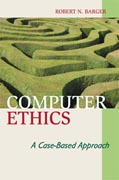
Teaches students how to solve ethical dilemmas in the field of computing, taking a philosophical, rather than a legal, approach to the topic. It first examines the principles of Idealism, Realism, Pragmatism, Existentialism, and Philosophical Analysis, explaining how each of them might be adopted as a basis for solving computing dilemmas. The book then presents a worksheet of key questions to be used in solving dilemmas. Twenty-nine cases, drawn from the real-life experiences of computer professionals, are included in the book as a means to let students experiment with solving ethical dilemmas and identify the philosophical underpinnings of the solutions. INDICE: 1. Introduction; 2. The computer as a humanizing agent; 3. Philosophic belief systems; 4. A philosophic inventory; 5. The possibility of a unified ethical theory; 6. The ethical decision making process; 7. Psychology and computer ethics; 8. The computing field as a profession; 9. Computer-related codes of ethics; 10. Computer ethics and international development; 11. Robotics and ethics; 12. Theft and piracy concerns; 13. Cases concerning theft and piracy; 14. Privacy concerns; 15. Cases concerning privacy; 16. Power concerns; 17. Cases concerning power; 18. A miscellaneous collection of cases; 19. Parasitic computing case; Appendix: Topics for presentations, discussions, and papers.
- ISBN: 978-0-521-70914-9
- Editorial: Cambridge University
- Encuadernacion: Rústica
- Páginas: 264
- Fecha Publicación: 01/06/2008
- Nº Volúmenes: 1
- Idioma: Inglés
